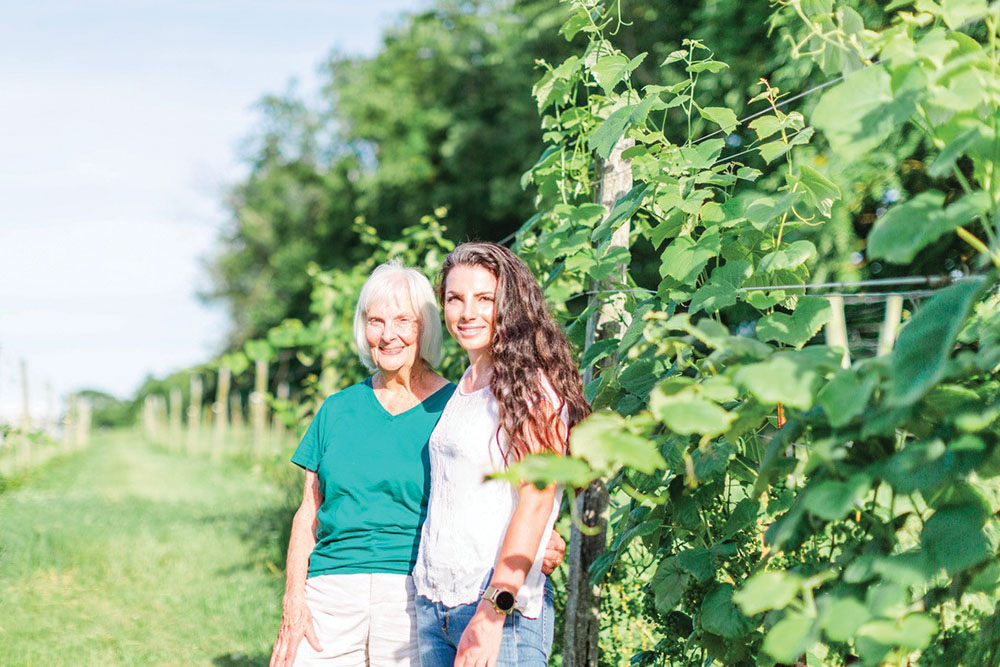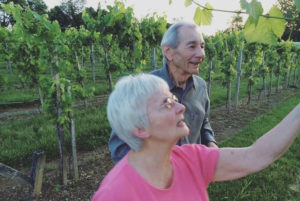
Growing up, Rachel Lipman thought you needed white hair and a mustache to be a winemaker. Today, the 29 year old is one of the youngest Jewish winemakers in Maryland.
At Loew Vineyards in Frederick County’s Mount Airy, the fifth-generation winemaker is maintaining a 150-year-old tradition that was nearly extinguished by the Holocaust, but revived by her grandfather.
“It’s history in a bottle,” says Lipman, a member of Beth Sholom Congregation in Frederick.

Her grandfather, William Loew, grew up in Lvov, Poland (now the Ukrainian city of Lviv), which, before World War II, was home to many Jewish-owned wineries, meaderies and distilleries. For several generations, Loew’s immediate and extended family were leading producers of mead, which is made by fermenting honey.
But the city’s Jewish population, the family’s winemaking business and the family itself were almost completely eradicated by the Nazis. Only 800 of the city’s 200,000 Jews survived the genocide. The Loew family, at 80 people before World War II, was nearly wiped out, and all their wineries were destroyed.
Loew, however, survived a Budapest political prison and two concentration camps. In 1945, he was liberated by the U.S. Army’s 99th Infantry Division, and in 1949, he immigrated to the U.S., where he met and married Lois Hendrickson.
For years, he lived in Rockville and worked for the Food and Drug Administration. Upon retiring in 1982, he purchased a 37-acre plot in Mount Airy, aiming to recreate from memory the aromas and flavors of his family’s honey wine.
In bringing his family business back to life, Loew pioneered Maryland’s winemaking industry. He and Lois helped found the Maryland Grape Growers Association and the Maryland Wineries Association — organizations that have supported a few other Jewish winemakers in the area, with the number of wineries in the state steadily increasing in recent years.
“To me, the vineyard is evidence that the Loew family survived,” Lipman says. “The idea is to have a successful production that’s sustainable for future generations so the story can continue.”
‘Why I’m living and can be Jewish’
Forty years after establishing the vineyard, and just eight days shy of the 77th anniversary of his liberation, Loew died on April 15 at 96. Now, Lipman and her grandmother run the winery — the fourth-oldest in the state — without him.
The oldest grandchild, Lipman joined the vineyard full time in 2018, having begun working there daily with Loew years before.
“It’s incredibly sad that he’s gone,” she says, “but it’s a privilege to be able to preserve his legacy.”
To that end, she has pored over historical documents to unearth more about her family’s past. Her findings include mead labels from her great-grandfather’s business dating back to 1870.
Decades later, mead is flourishing once again. Lipman recently invested in new fermentation tanks to meet growing demand. Many of the meads she makes are fermented with grape juice (called pyments) or apple juice (cysers); they are dry, semi-dry and semi-sweet.
In a similarly bittersweet way, her connection to Judaism has also been shaped by winemaking.
“My grandfather’s legacy is why I’m living and can be Jewish,” she says. “My family and I feel very lucky that we’ve had all of this time with him, and that he and my grandmother were able to build something beautiful that we can share with any customer who walks through the door.”
Endocrinologist by day, winemaker by … day

Unlike Lipman, Dr. Errol Rushovich did not major in plant science at the University of Maryland. Nor did Rushovich, the chief of the endocrinology division at Mercy, intern at an organic vineyard in France’s Loire Valley.
But, like Lipman, Rushovich and his wife, Berenice, own a vineyard in Mount Airy — smaller, at 10 acres, on a 127-acre farm they bought in 2014. The couple planted vines in 2015 and began selling the fruit to local wineries a few years later.
In May of 2021, they received a grant from Frederick County to expand their program for using ducks as pest control. And this March, they hired a winemaker and started their own wine label; so far, there’s been positive feedback, said Rushovich, whose interest in winemaking emerged from his and his wife’s passion for cycling.
The couple have ridden their bikes in Switzerland, Italy and Japan, as well as across the country. About a decade ago, they were cycling in Iowa. They liked the countryside so much they decided to buy a farm there. Eight years ago, they sold it and bought one closer to their Pikesville home.
“It turned out soil-wise to be very suitable for a vineyard,” says Rushovich, who, until two years ago, belonged to Chizuk Amuno Congregation for 20 years.
Since then, he has learned — in part from the Maryland Grape Growers Association, which the Loews helped establish — that there’s more to running a vineyard than meets the eye. Each of his 7,000 vines, he says, “requires constant attention” because they are so susceptible to things like humidity, hail, tornadoes, disease and Japanese beetles.
Luckily, he has a manager living on the farm who talks with him on a daily basis. “Once, we had temperatures of 27 degrees, and our manager was up at 3 a.m. building fires,” Rushovich says.
Additionally, a consultant and crew visit Libertas Estates regularly, and he and his wife, who handles administrative duties, head there every weekend to “do whatever needs to be filled in,” Rushovich says.
The work isn’t easy, but he enjoys the challenge. Rushovich, who is 62, says he plans to retire from his career as a physician in a year or two, or three. Until then, running Libertas Estates offers a respite from the stress of being responsible for others’ lives. “I can have some other project that I’m thinking about,” he says.
Owning a winery isn’t so different from being a doctor, he added, in that — though his “patients” are plants, not people — he is managing the unpredictable in both cases.
And this unpredictability is why Berenice Rushovich, a child welfare research scientist, feels a Jewish connection while working on the vineyard with her husband. In Judaism, many holidays and practices are rooted in the agricultural cycle described in the Torah.
“The Shema talks about rain,” she says of the most important prayer in Judaism. “Farming is something you don’t always have a lot of control over. It makes sense why people prayed.”
‘A gift from God’

Like Errol Rushovich, Garry Cohen got into winemaking while vacationing with his wife. And like the Rushoviches, he has learned to “take what nature gives you,” says Cohen, a member and former president of Beth Sholom in Frederick.
This philosophy is reflected in the name of Cohen’s vineyard: Mazzaroth, a word for “constellations” that appears only once in the Torah. In the Book of Job, God tells a struggling Job to “work with nature,” Cohen paraphrased, and look at the mazzaroth for guidance.
Looking to the sky as an air traffic controller, Cohen was required by law to retire by age 56, but “didn’t know what I wanted to do when I grew up,” he says.
About 20 years ago, while winery-hopping with his wife, Micki, he decided he’d become a winemaker. A decade later, the couple, originally from Baltimore, moved to a property in Middletown, Frederick County, and planted their first quarter-acre of grapes.
Cohen got his winery license in April 2016 and retired the same month — two years before he was required, and originally planning, to do because “the vineyard started taking over and something had to give,” he says.
Over the years, Mazzaroth Vineyard has expanded to two acres, but Cohen wants it to stay the same size; he often works 12-hour days, six days per week. Micki Cohen, a retired public school speech therapist, helps out, but he says he handles the vast majority of tasks.
Garry Cohen has found growing grapes to be more challenging than winemaking, but he’s mastered the art and science by reading up on the subject and joining the Maryland Grape Growers Association — and through trial and error.
And his labor has borne fruit. He often sees customers at restaurants drinking bottles of Mazzaroth wine.
There are literal rewards, too. Mazzaroth’s Vidal Blanc was recently one of three wines to earn double gold medals in the 2022 Maryland Winemasters Choice Awards.
“We’re over the moon,” Cohen says, adding that the white wine has flavors of pineapple, tangerine and grapefruit. “Grapes are the only fruit that can taste like other fruits. They’re a gift from God; they’re holy.”
In this vein, no work is done at the vineyard on Shabbat, and the wines are all-natural, made without the herbicide glyphosate. “We seek to repair the earth,” Cohen says. “To me, the vineyard is a very spiritual place.”
Cohen said many friends and family members were skeptical when he started his winemaking business. Now, they’re proud of his success, and he has a poignant life lesson to share with his three adult children.
“With hard work,” he says, “you can achieve things that most people would look at you and say, ‘You’re kind of crazy to go into this.’”
This article originally appeared in the Baltimore Jewish Times, a sister publication of Baltimore Style.




